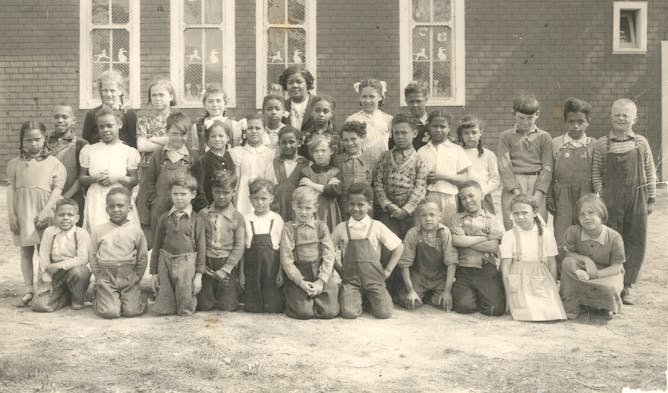|
|
|
|
In the wake of several setbacks to the vaccine rollout, Canada has one of the lowest COVID-19 vaccination rates among developed countries. On the surface, the problem seems to be delayed deliveries and distribution issues. But this is just the latest episode in a long drama. To understand the problem, we need to go all the way back to the 1980s.
Today in The Conversation Canada, Joel Lexchin of the University of Toronto explains how Canada’s current COVID-19 vaccine shortage is the cliff-hanger ending to a decades-long tale of unheeded warnings, missed opportunities and dismantled resources.
Also today:
Regards,
|
Patricia Nicholson
Health + Medicine Editor
|

|
|

A health-care worker prepares a dose of the Pfizer-BioNTech COVID-19 vaccine at a UHN COVID-19 vaccine clinic in Toronto on Thursday, January 7, 2021.
THE CANADIAN PRESS/Nathan Denette
Joel Lexchin, University of Toronto
Behind Canada’s current COVID-19 vaccine shortage is a decades-long tale of unheeded warnings, missed opportunities and dismantled resources that was never going to end well.
|

Students of School Section #13 with teacher, Verlyn Ladd, who taught at the school from 1939 to 1958. Class of 1951, Buxton, Raleigh Township, Ontario.
(Buxton National Historic Site & Museum)
Funké Aladejebi, University of Toronto
An 1850 act permitted the creation of separate schools for Protestants, Catholics and for any five Black families. Some white people used the act to force Black students into separate institutions.
|

Minister of Justice David Lametti gives a thumbs up as he rises to vote in favour of a motion on Bill C-7, medical assistance in dying, in the House of Commons on Dec. 10, 2020.
THE CANADIAN PRESS/Justin Tang
Heidi L. Janz, University of Alberta; Leonie Herx, Queen's University, Ontario
Expanding access to medical assistance in dying (MAID) to those not terminally ill puts vulnerable people at risk of feeling pressured into MAID, and doctors at risk of being forced to facilitate it.
|

Research shows the breast milk of women who have recovered from COVID-19 offers a source of COVID-19 antibodies.
(Shutterstock)
Meghan Azad, University of Manitoba; Katie Hinde, Arizona State University; Lars Bode, University of California San Diego; Luisa Zuccolo, University of Bristol; Merilee Brockway, University of Manitoba; Nathan C. Nickel, University of Manitoba; Rafael Perez-Escamilla, Yale University
Researchers don't fully understand the composition of breast milk and its benefits. Beyond nutrition, it contains enzymes, hormones and the mother's antibodies — including antibodies for COVID-19.
|

The COVID-19 pandemic has hit freelancers and gig workers hard. Here’s how they can get through the crisis.
(Piqsels)
Mostafa Ayoobzadeh, Concordia University
Freelancers who have lost work during the COVID-19 crisis can take steps to ensure they have a successful long-term career in the post-pandemic period.
|
La Conversation Canada
|

Wall Street et les marchés financiers sont secoués par le phénomène WallStreetBets. Des intervenants amateurs s’adonnent à des tâches normalement réservées aux conseillers ou analystes du domaine des finances, réinventant les rôles dans le secteur.
(AP Photo/Seth Wenig)
Pierre-Yann Dolbec, Concordia University
WallStreetBets est en train de remodeler les marchés financiers. Les acteurs non professionnels du marché font le travail traditionnellement effectué par les conseillers et les analystes financiers.
|

Les avantages de l'étirement statique dans le cadre d'un échauffement complet avant l'exercice semblent l'emporter sur les inconvénients.
Shutterstock
David George Behm, Memorial University of Newfoundland; Anthony Blazevich, Edith Cowan University; Anthony David Kay, University of Northampton; Gabriel S. Trajano, Queensland University of Technology
Les étirements statiques, délaissés depuis que des études suggèrent qu’ils réduisent les performances, pourraient faire un retour en force à la suite de nouvelles recherches.
|
Arts
|
-
Daniel Johnston, University of Sydney
Theatre and audiences are slowly beginning to share the same airspace again. We are freshly conscious of breath, but it has always been intimately linked with the dramatic arts.
|
|
Environment + Energy
|
-
Ilona Kater, Durham University; Robert Baxter, Durham University; Simone Abram, Durham University
The Arctic is particularly vulnerable to climate change, but efforts to tackle it risk alienating the people who live there.
|
|
Politics
|
-
Paul Ringel, High Point University
In the early hours of Feb. 10, 1971, heavily armed officers moved in on a house occupied by Black Panther activists – marking a policing trajectory toward a more militarized response to Black activism.
|
|
| |
| |
| |
| |

|
| |
| |
| |
| |
| |
| |
| |
| |
|
|
|
|
|
|
|